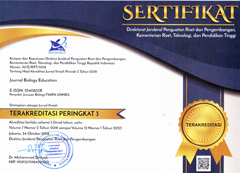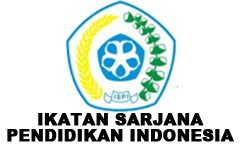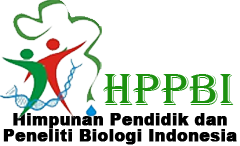The Students Worksheets Based on Problem Based Learning (PBL) on Ecosystem Materials
Abstract
Based on observations, the worksheets used in Senior High School 11 Semarang only contain a summary of the content of the material and the questions so that the activities presented do not facilitate the students. In addition, the learning process had not stimulated students to solve real problems. Learning tends to be memorized and textual. Implementation of Students Worksheets based on PBL can improve activities and student learning outcomes also guide students towards concept development through information and instructional task instructions to conduct investigations or problem solving, students are active in learning, and collaborative learning. This research aimed to analyze the validity, legibility, and effectiveness of Students Worksheets based on PBL on ecosystem material. This research was conducted at Senior High School 11 Semarang with a Research & Development (R&D) research design. The research steps included potential and problem identification, data collection, product design, design validation, design revision, small-scale trials, product revisions, large-scale trials, product revisions, and final products. Small-scale trials were carried out on 10 students of class XII MIPA 5 and a biology teacher. A large-scale trial was conducted on 36 students of class X MIPA 6 online due to the Covid-19 pandemic using a pre-experimental design in the form of a one-group pretest-posttest. The data analysis used descriptive percentages. Students Worksheets based on PBL have printed teaching materials with A4 paper size, combined with attractive pictures, illustrations, and colors, containing real problems around students such as the eutrophication of Rawa Pening and the eruption of Mount Merapi, and containing PBL syntax according to Arends (2012). Students 'classical completeness was 86.11% with an increase in students' understanding of the concept of the medium category. The average percentage of students' skills competency assessment obtained very good criteria. Students responded very well in large-scale trials. Based on these results, it can be concluded that the development of Students Worksheets based PBL on ecosystem materials is feasible and effectively used to improve student learning outcomes.
The copyright of the article once it is accepted for publication shall be assigned to the journal as the publisher. The intended copyright includes the right to publish the article in various forms (including reprints). The journal maintains the publishing rights to the published articles.
This work is licensed under a Creative Commons Attribution 4.0 International License.







